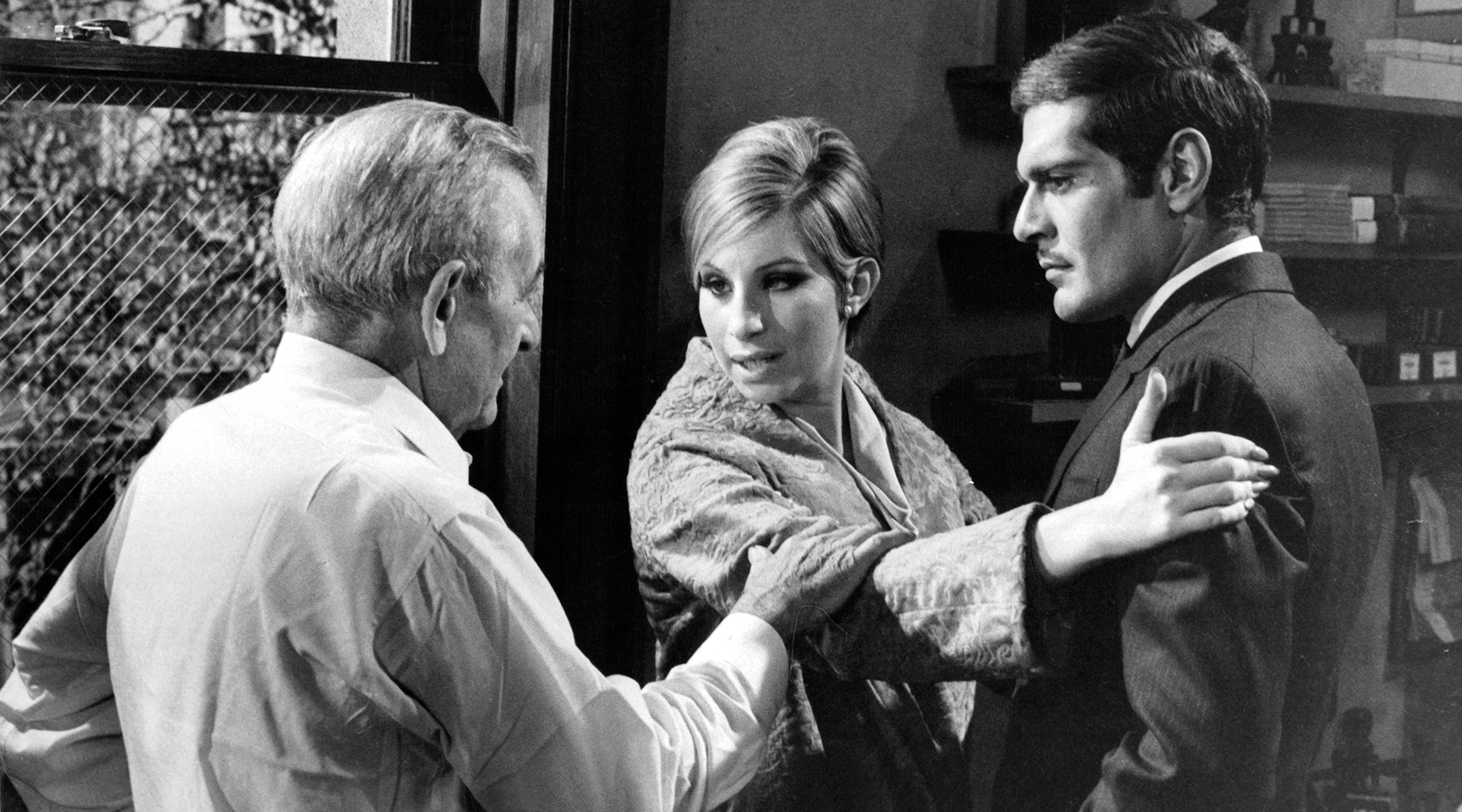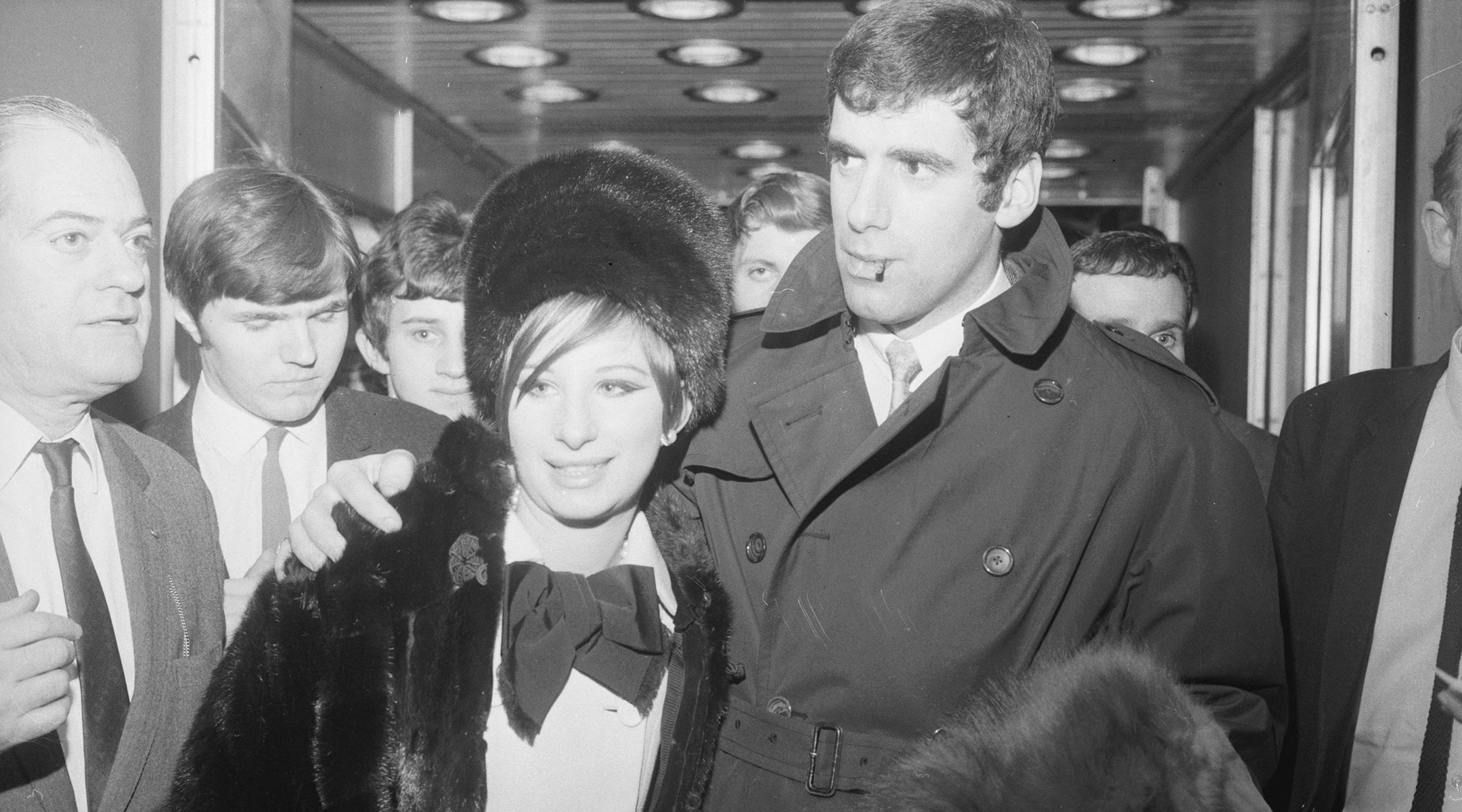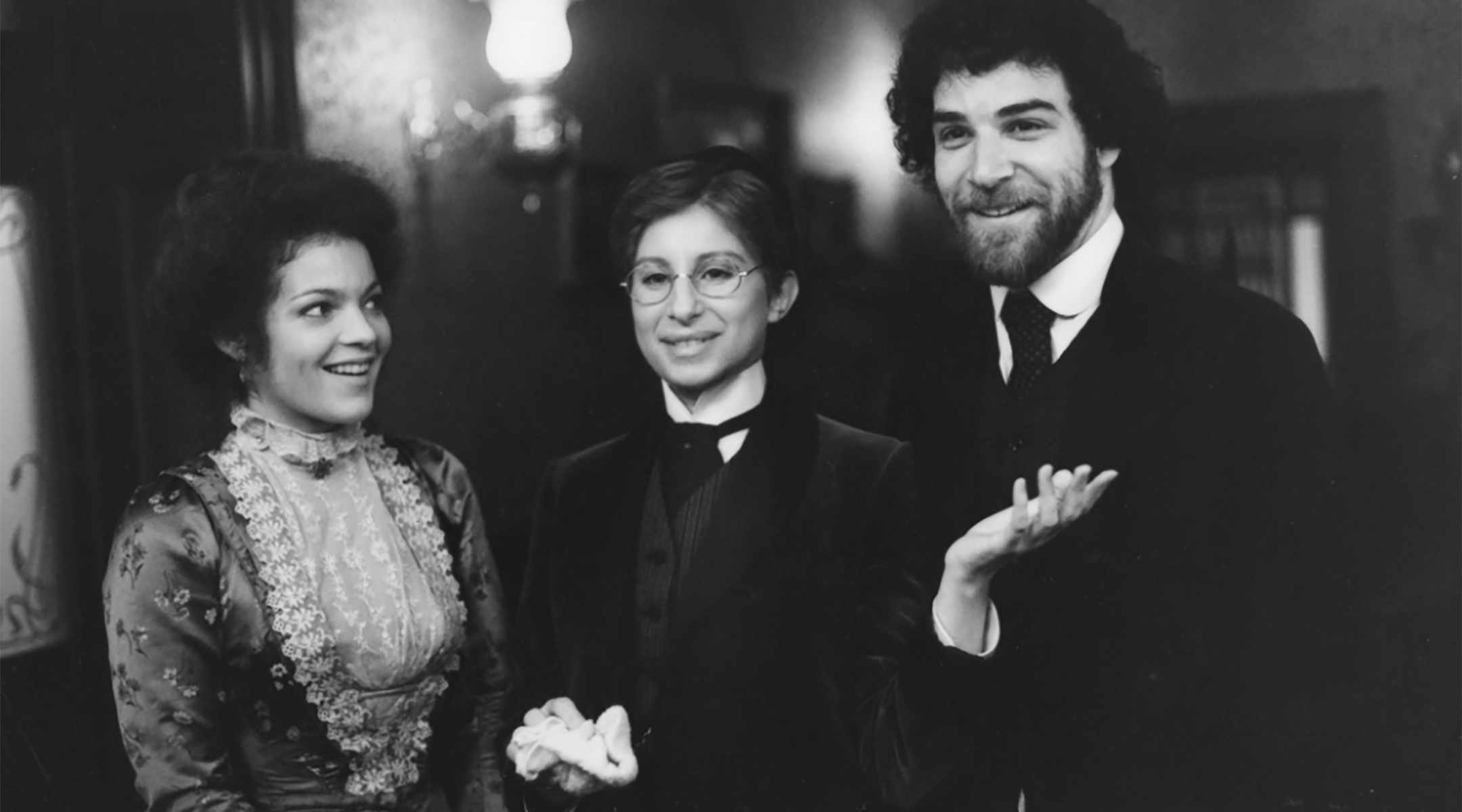The most Jewish moments from Barbra Streisand’s memoir
From her marriage to Elliot Gould to her love of knishes

Barbra Streisand with director William Wyler, left, and Omar Sharif on the set of the film “Funny Girl,” 1968. (Columbia Pictures/Getty Images)
(JTA) — Throughout Hollywood history, many stars of Jewish ancestry have soft-pedaled that heritage, changing their names or speaking rarely, if at all, about their Jewishness.
No one can accuse Barbra Streisand of either.
The singer and actress of the stage and screen — one of the most beloved Jewish American icons of the past half-century — published her long-awaited memoir, “My Name is Barbra,” earlier this month. Throughout, Streisand references her Jewish background constantly, often peppering in Yiddish words and callbacks to her Brooklyn Jewish upbringing.
Here are the Jewish highlights from “My Name is Barbra.”
Brooklyn days
Streisand was born in Brooklyn, in April 1942. In the book, she writes of her grandfather taking her to an Orthodox synagogue and of attending a yeshiva when she was young — an experience that later prepared her for her movie “Yentl.”
Streisand’s father died when she was 15 months old. She first lived with her grandparents, on Pulaski Street in Williamsburg. When she was eight, her mother remarried and they moved to a different part of Brooklyn.
“We pulled up to a tall brick building (one of many that all looked alike) on Newkirk Avenue in Flatbush, part of a big public housing project called the Vanderveer Estates (a very fancy name for a not-so-fancy place),” she writes in the book. “I remember being very impressed that there was an elevator. I thought we were rich now.”
Broadway bound
The very first Broadway show Streisand ever attended, at age 14, was a 1950s staging of “The Diary of Anne Frank,” and it activated ambitions to one day star on Broadway herself.
“I was mesmerized by the play,” she writes. “Anne is fourteen, I’m fourteen. She’s Jewish, I’m Jewish. Why couldn’t I play the part?” In an early theater role, she appeared in the same cast as legendary Jewish comedian Joan Rivers, then still going by her given name Joan Molinsky.
Later, Streisand’s first big Broadway part was in the musical “I Can Get It For You Wholesale,” in which she played a Jewish secretary named Yetta Tessie Marmelstein. While working on that show, she met Elliott Gould, the Jewish actor who would become her first husband and the father of her son Jason.

Streisand shown with her then-husband Elliott Gould, March 17, 1966. (Harry Dempster/Express/Getty Images)
Described by the author as “two Jewish oddballs who found each other,” Gould and Streisand married and divorced entirely prior to their respective movie star heydays in the 1970s.
Jewish food
Streisand writes repeatedly about her love of food — from complaining about the subpar offerings at a Jewish camp she attended in the Catskills at age 8 to her inability to find New York-quality food while traveling overseas. She also discusses her habit of bringing food with her everywhere.
“Maybe it’s part a collective unconscious of European Jews, because what if a pogrom came and you had to get across the border fast?” she writes. “You have to have a little something to eat until you get to the next country.”
Later, she gushes about knishes from Yonah Schimmel’s on Houston Street in New York.
Jewish collaborators
Streisand worked with many Jewish songwriters, directors, and arrangers during her Broadway days, including Jerome Robbins, Marvin Hamlisch and Jule Styne. “My Name is Barbara,” the song that provides the book its title (albeit with a slightly different spelling), was written by Leonard Bernstein, and she took it up after discovering a book of sheet music of Bernstein’s compositions.
“Can you believe it? I was amazed that such a thing existed,” Streisand writes of finding the song. “Now that’s bashert,” she added, using the Yiddish word for “meant to be.”
“Funny Girl,” on stage and screen
“Funny Girl,” the 1964 Broadway musical in which Streisand played the Jewish comedian Fanny Brice, made her a household name.
“Obviously, we were both Jewish, born in New York City… she was raised on the Lower East Side… so there would be a similar cadence in our speech,” Streisand writes of playing Brice. “I’d already noticed that if I spoke in the Brooklyn accent I had heard growing up, with that distinctive Jewish delivery, people would often laugh… we both had Jewish mothers who were concerned about food and marrying us off.. not necessarily in that order.”
The Jewish Broadway legend Stephen Sondheim, who had been considered to write “Funny Girl” but ultimately didn’t, had insisted that a Jewish performer play Brice. “And if she’s not Jewish — she at least has to have the nose!” Sondheim said at the time, according to Streisand. In 1985, Streisand would lead off her “Broadway Album” with Sondheim’s “Putting It Together” and include several other of his songs.
A troubled production that became a huge hit, the success of “Funny Girl” on Broadway led to a 1968 film adaptation, directed by Jewish filmmaker William Wyler, that won Streisand the Best Actress Oscar. In the film, the Egyptian actor Omar Sharif was cast in the male lead opposite Streisand. In a movie shot not long after the Six-Day War, Streisand writes, “Some people didn’t like the idea of an Arab man romancing a Jewish woman.”
When headlines stated that the reaction to the casting in Sharif’s homeland had been negative, Streisand joked, “‘Egypt angry?’ You should hear what my aunt Anna said.”
In 1973, another hit movie starring the actress, “The Way We Were,” involved a love story set against the backdrop of the House Un-American Activities Committee hearings, between a “Jewish girl” (Streisand) and “gentile boy” played by Robert Redford.
A “nice Jewish girl” on the cover of Playboy
A notable sex symbol throughout the 1970s, Streisand famously appeared on the cover of Playboy in 1977 with the headline “What’s a nice Jewish girl like me doing on the cover of Playboy?” She did not pose nude but did participate in a lengthy interview. The book, for the first time, includes a photograph, from that same shoot but unused, of Barbra in a Playboy bunny costume.
Barbra and Bella
Streisand has been a supporter and friend of numerous Democratic presidents and other political figures. When she started to get politically active, around 1970, she became a close friend and supporter of Jewish politician Bella Abzug, when she ran for Congress.
“Here we were, two Jewish girls… Bella from the Bronx and Barbra from Brooklyn… who made good!” Streisand writes.
Streisand later discovered that both she and Abzug were included on President Richard Nixon’s enemies list.
“Yentl” stories
In 1983, Streisand made her directorial debut with “Yentl,” an adaptation of the Isaac Bashevis Singer short story “Yentl, the Yeshiva Boy,” about a girl in 19th-century Poland who disguises herself as a boy to attend a yeshiva.
“I’ve always been proud of my Jewish heritage,” Streisand writes, about her desire to make “Yentl.” “I never attempted to hide it when iI became an actress. It’s essential to who I am… And I wanted to make this movie about a smart Jewish woman who represented so many qualities I admire.”
Her son, Jason, studied for his bar mitzvah around the same time that his mother was preparing to make “Yentl.”
The movie was filmed in what was then Czechoslovakia, beyond the Iron Curtain, at a time when the communist government was cracking down on Jewish worship. But Streisand wore a Jewish star on her cap while in that country — and “wore it defiantly,” she writes.
Streisand also clashed with her co-star, the famed Jewish actor Mandy Patinkin, on the set of “Yentl.” She hadn’t wanted to cast Patinkin, who at that point was much better known as a Broadway actor, and she considered Richard Gere for the role. According to the book, once filming started, Patinkin behaved in a hostile way on the set. When Streisand asked why, he answered: “I thought we were going to have an affair.”

Amy Irving, Streisand and Mandy Patinkin on the set of “Yentl.” (Courtesy of Penguin Random House)
When Streisand replied “I don’t operate that way,” she writes, the actor, then in his late 20s, cried. She threatened to replace him, and they continued to clash after that, but Streisand ultimately praises Patinkin’s work in the film.
Many years later, Streisand writes, Patinkin asked Streisand to write a blurb on one of his albums, and she brought up what had happened on the set. As an explanation for his behavior, Patinkin told her that he was “scared.”
Barbra and Israel
A premiere was held for “Yentl” in Israel in April of 1984, and on the same visit, Streisand dedicated the Emanuel Streisand School of Jewish Studies at Hebrew University in Jerusalem, named for her father. On the trip, she met with both the then-current prime minister, Yitzhak Shamir, and a future prime minister and president, Shimon Peres. Streisand was not daunted by a terrorist shooting that took place in Jerusalem while she was in the country and continued her trip as scheduled.
In 1993, during the negotiations that would lead to the Oslo Accords, Streisand was invited to a luncheon with Prime Minister Yitzhak Rabin, through her close friendship with President Bill Clinton. Streisand was later involved with an effort to make a film about the lives of Rabin and Yassir Arafat, leading up to their handshake at the White House. The project remained alive even after Rabin’s assassination in 1995 but later fell apart due to a financial dispute between the Showtime network and the director.
Streisand returned to Israel in 2013, for her first-ever concert in the country, and also to sing at a 90th birthday celebration for Shimon Peres. On that trip, she drew controversy when she gave a speech about the treatment of women in Israel.
“It’s distressing… to read about women in Israel being forced to sit in the back of the bus… or when we hear about the Women of the Wall having metal chairs hurled at them while they attempt to peacefully and legally pray,” she said in a speech while receiving an honorary doctorate from Hebrew University.
Obama’s Jewish joke
In 2015, Streisand received the Presidential Medal of Freedom, along with fellow honorees Sondheim and Steven Spielberg. “Born in Brooklyn to a middle-class Jewish family,” President Barack Obama joked in his introduction speech. “I didn’t know you were Jewish, Barbra.”
This article originally appeared on JTA.org.
A message from our Publisher & CEO Rachel Fishman Feddersen

I hope you appreciated this article. Before you go, I’d like to ask you to please support the Forward’s award-winning, nonprofit journalism so that we can be prepared for whatever news 2025 brings.
At a time when other newsrooms are closing or cutting back, the Forward has removed its paywall and invested additional resources to report on the ground from Israel and around the U.S. on the impact of the war, rising antisemitism and polarized discourse.
Readers like you make it all possible. Support our work by becoming a Forward Member and connect with our journalism and your community.
— Rachel Fishman Feddersen, Publisher and CEO





























